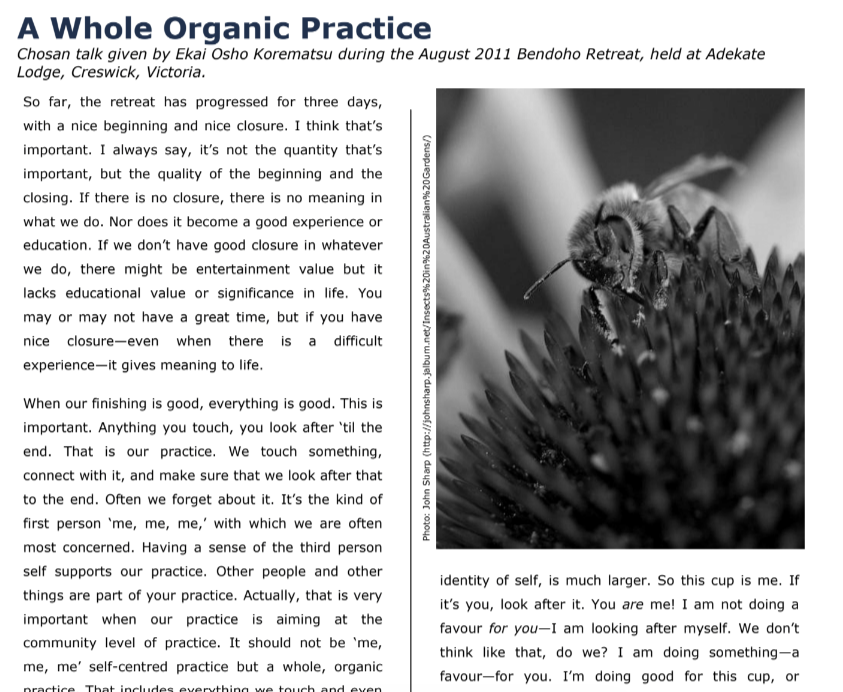Editorial
We begin the 49th edition of Myoju with the sincere expression and heartfelt gratitude for the generosity and kindness of Azuma Roshi, Abbott of Daijoji Monastery in Kanazawa in Japan. It is due to his compassionate support that many students from the Jikishoan Zen Buddhist community have had the great fortune and honour to experience Sanzen practice at Daijoji Monastery—as Osho-sama so beautifully expresses on page 3 in his article ‘Azuma Roshi’s Teaching, Generosity and Kindness’. The theme of this 2012 Spring edition of Myoju is ‘First Teacher, First Encounter—True Love’. In this light, we see several articles chronicling the first encounter with one’s first teacher.
On page 4, Ekai Osho remembers his first teacher, Kobun Chino Roshi, in an article that was also included in a recently published book called, Remembering Kobun. On page 7, Jim Holden provides an excerpt of a teaching by Kobun Chino Roshi. This is followed by the translation of an article by Isshin Taylor from a talk by Akiba Gengo Roshi of Kojin-an Zendo in Oakland California, entitled, ‘Steve Jobs and Zen’ which provides an insight into one of Kobun Roshi’s more well-known students.
On page 14, we provide tribute for and remember the generosity of Jikishoan member, the late Helen Burbery-Gireth, and read of her first teacher, Sasaki Roshi. After hearing his name spoken, Helen was stimulated to awaken after three weeks of coma in a hospital bed.
On page 12, Mark Summers reports on the community’s fourteenth Annual General Meeting, held on 9 September2012, and ninth committee orientation workshop, held on 16th September 2012.
On page 13, experiences on recent retreats spill over into poetic expression provided by James Watt and Vaughan Behncke.
On page 16, Shona Innes writes of her practice visit to the San Francisco Zen Centre, where Jikishoan’s Abbott Ekai Osho met his first teacher Kobun Chino Roshi, and assisted with setting up Kohin-an Oakland Zen Centre, conducting weekly regular zazen-kai there for three years. Shona speaks of the richness of experience she enjoyed and expresses gratitude to all those in both California and in the Jikishoan Community in Australia who supported her practice time overseas.
On page 18, Harry Laing provides a light-hearted and funny interpretation of some of the terms and definitions used on retreat, and we enjoy once more the beautiful poetry of Christine Maingard. On page 22, the Soto Kitchen provides two more delicious recipes to try. The regular inclusions—Education News, Calendar of Events and Teaching Schedule—convey how the core activities of the community have unfolded and of those coming up, to be enjoyed in the new year.
As the year of the Dragon draws to a close, and the rising Phoenix imparts a sense of new beginnings to so many who have successfully navigated a year of transformation and learning, we reflect, once more, upon the still waters of Zen Master Dogen’s wisdom in that: ‘Each moment of zazen is equally wholeness of practice, equally wholeness of realization. This is not only practice while sitting, it is like a hammer striking emptiness: before and after, its exquisite peal permeates everywhere. How can it be limited to this moment?’—Zen Master Dogen Written on the day of the Solar Eclipse, Wednesday 14 November, 2012
Karen Tokuren Threlfall—on behalf of the Jikishoan Editorial Board

